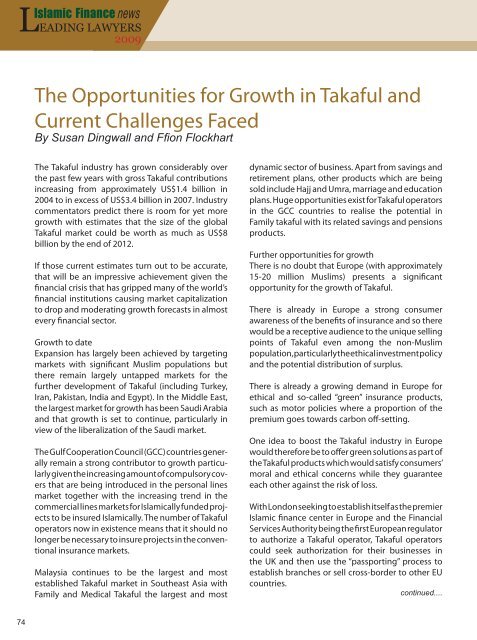legal guide09.indd - Islamic Finance News
legal guide09.indd - Islamic Finance News
legal guide09.indd - Islamic Finance News
You also want an ePaper? Increase the reach of your titles
YUMPU automatically turns print PDFs into web optimized ePapers that Google loves.
The Opportunities for Growth in Takaful and<br />
Current Challenges Faced<br />
By Susan Dingwall and Ffi on Flockhart<br />
The Takaful industry has grown considerably over<br />
the past few years with gross Takaful contributions<br />
increasing from approximately US$1.4 billion in<br />
2004 to in excess of US$3.4 billion in 2007. Industry<br />
commentators predict there is room for yet more<br />
growth with estimates that the size of the global<br />
Takaful market could be worth as much as US$8<br />
billion by the end of 2012.<br />
If those current estimates turn out to be accurate,<br />
that will be an impressive achievement given the<br />
financial crisis that has gripped many of the world’s<br />
financial institutions causing market capitalization<br />
to drop and moderating growth forecasts in almost<br />
every financial sector.<br />
Growth to date<br />
Expansion has largely been achieved by targeting<br />
markets with significant Muslim populations but<br />
there remain largely untapped markets for the<br />
further development of Takaful (including Turkey,<br />
Iran, Pakistan, India and Egypt). In the Middle East,<br />
the largest market for growth has been Saudi Arabia<br />
and that growth is set to continue, particularly in<br />
view of the liberalization of the Saudi market.<br />
The Gulf Cooperation Council (GCC) countries generally<br />
remain a strong contributor to growth particularly<br />
given the increasing amount of compulsory covers<br />
that are being introduced in the personal lines<br />
market together with the increasing trend in the<br />
commercial lines markets for <strong>Islamic</strong>ally funded projects<br />
to be insured <strong>Islamic</strong>ally. The number of Takaful<br />
operators now in existence means that it should no<br />
longer be necessary to insure projects in the conventional<br />
insurance markets.<br />
Malaysia continues to be the largest and most<br />
established Takaful market in Southeast Asia with<br />
Family and Medical Takaful the largest and most<br />
dynamic sector of business. Apart from savings and<br />
retirement plans, other products which are being<br />
sold include Hajj and Umra, marriage and education<br />
plans. Huge opportunities exist for Takaful operators<br />
in the GCC countries to realise the potential in<br />
Family takaful with its related savings and pensions<br />
products.<br />
Further opportunities for growth<br />
There is no doubt that Europe (with approximately<br />
15-20 million Muslims) presents a significant<br />
opportunity for the growth of Takaful.<br />
There is already in Europe a strong consumer<br />
awareness of the benefits of insurance and so there<br />
would be a receptive audience to the unique selling<br />
points of Takaful even among the non-Muslim<br />
population, particularly the ethical investment policy<br />
and the potential distribution of surplus.<br />
There is already a growing demand in Europe for<br />
ethical and so-called “green” insurance products,<br />
such as motor policies where a proportion of the<br />
premium goes towards carbon off-setting.<br />
One idea to boost the Takaful industry in Europe<br />
would therefore be to offer green solutions as part of<br />
the Takaful products which would satisfy consumers’<br />
moral and ethical concerns while they guarantee<br />
each other against the risk of loss.<br />
With London seeking to establish itself as the premier<br />
<strong>Islamic</strong> finance center in Europe and the Financial<br />
Services Authority being the first European regulator<br />
to authorize a Takaful operator, Takaful operators<br />
could seek authorization for their businesses in<br />
the UK and then use the “passporting” process to<br />
establish branches or sell cross-border to other EU<br />
countries.<br />
continued....<br />
74
















